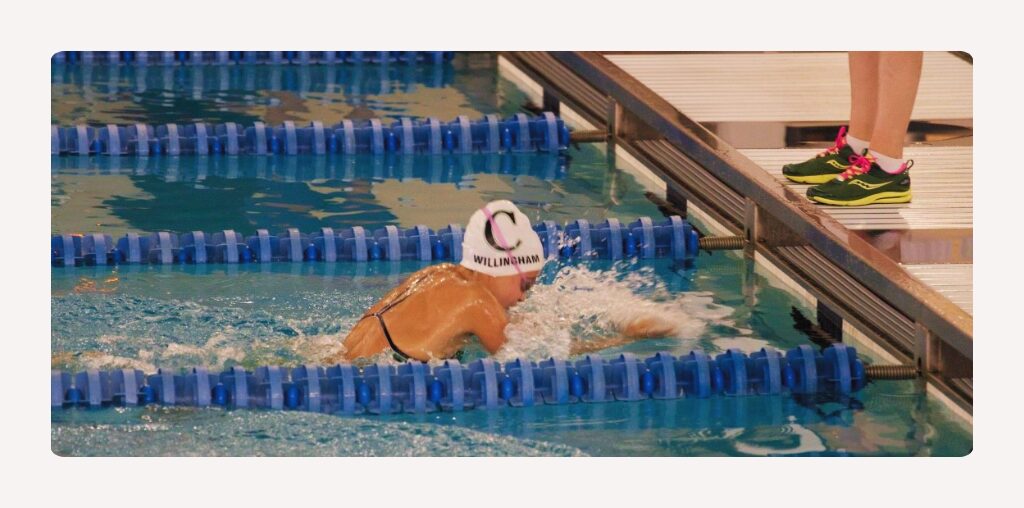How Sports Dietitian Emma Ware Helps Young Athletes Excel and Stay Healthy
Imagine pushing your limits in every practice and competition, knowing your body is fueled to prevent injury, optimize performance and improve recovery. This crucial support of young athletes is made possible by sports dietitians like Emma Ware, who specialize in crafting personalized nutrition plans to help adolescents excel in their sport and remain competitive and active in the future.
Inspired as a Young Athlete
In her youth as a competitive swimmer practicing four hours daily, Emma was referred by her pediatrician to a sports dietitian at our hospital and discovered she was unintentionally underfueling. She remembers leaving her first appointments fascinated by the scientific reasons behind the dietician’s recommendations. While reaping the athletic benefits of her nutritional education, Emma’s family also became more invested in nutrition from the perspective of learning how to support her brother’s newly diagnosed Type 1 diabetes.
For an adolescent beginning to consider her future, an occupation bridging the gap between nutrition and sports left an impression on Emma. Combining science, empathy and her passion to enhance athletic performance and health, she now cares for patients at Texas Children’s as senior clinical dietitian in our sports medicine department.

The Impact of a Sports Dietitian
As Emma’s own experiences indicate, athletes expend so much energy in training and competition that it can often be difficult to eat or fuel well enough to meet the demands of their sport. If athletes can meet their energy and hydration needs, follow a nutrient-dense eating pattern and fuel appropriately around training and competition, they not only perform significantly better but also prevent injuries and promote long-term health.
Emma works mainly with adolescent athletes, a group typically active in multiple sports and undergoing crucial growth and development physically, mentally and socially.
One of her success stories involves a highly competitive young athlete who initially had a negative relationship with food. Through consistent guidance and support, the athlete transformed her approach to nutrition, leading to significant improvements in health and performance.
“The symptoms of underfueling went away, her relationship with food improved, and she began winning competitions more frequently, eventually gaining national recognition in her sport,” Emma shares. For her, helping young athletes excel in their sport while maintaining a balanced approach to nutrition is the most rewarding part of her job.
“I try to help them create a resilient relationship with food and exercise that will help shape their ongoing attitudes and beliefs about nutrition.”
A Day in the Life of a Sports Dietitian
No two days in our sports medicine department are the same for Emma.
“Some days, I see patients individually for sports nutrition assessments and counseling; other days, I provide coverage for our sports medicine providers if they have a patient who would benefit from sports nutrition counseling,” Emma explains.
In between patients, you can find Emma working on educational projects and lectures or consulting with patients in our preventative cardiology clinic.
Unlike general dietitians, sports dietitians like Emma must understand the physiological demands of various sports and how nutrition impacts health, performance, recovery and injury prevention. Effective communication and motivational skills are also necessary, as pediatric dietitians must also educate and inspire young athletes to follow their recommendations.
Emma adds, “Athletes may be coming to see a sports dietitian to learn how to fuel better for their sport but there are often clinical factors that must be addressed in order to do so.” This could include anything from gastro-intestinal challenges, nutrition deficiencies, injuries or chronic illness, so it’s important that a sports dietitian understands the clinical issues in addition to the nuances of metabolism and the physiological demands of different sports.
Emma uses her communication and teamwork skills daily. As the sports dietitian for our sports medicine program, she often collaborates with a multidisciplinary team of physicians, athletic trainers, physical therapists, and other healthcare professionals to provide comprehensive care, especially for young athletes during critical growth periods.
“One of the many things I love about Texas Children’s is our interdisciplinary collaboration.”
Facing Challenges and Misconceptions About Sports Nutrition
Emma is keen to dispel common misconceptions about sports nutrition, particularly the overemphasis on supplements used to enhance performance. Instead, she stresses the importance of foundational nutrition habits, hydration and nutrient timing.
While she is cautious about trends, Emma feels it is important to remain current with new developments and adapt to the changing needs of young athletes. Valuing evidence-based practices that enhance her ability to support adolescent athletes effectively, she stays informed through reading, listening to podcasts, attending conferences, following reputable sources on social media, and through her own research efforts.
The Path to Becoming a Sports Dietitian
Aspiring dietitians need a solid educational foundation, including relevant certifications and clinical experience, to succeed in a pediatric setting like Texas Children’s.
Typically, the path begins with a bachelor’s degree in nutrition, dietetics, or a related field, followed by a supervised practice program or internship accredited by the Accreditation Council for Education in Nutrition and Dietetics (ACEND). This hands-on experience is crucial for developing practical skills in clinical nutrition. After completing an internship, candidates must pass the Commission on Dietetic Registration (CDR) exam to become a Registered Dietitian Nutritionist (RDN). Sports Nutrition is often not a focus of this curriculum, so aspiring sports dietitians typically must seek out more opportunities to learn in various sports nutrition settings and gain sports-specific experience.
Emma advises, “Be open-minded about gaining experience in other settings before focusing exclusively on sports, especially clinical experience.” Such experience equips dietitians with the skills needed to address the multifaceted challenges young athletes face.
For those looking to specialize in sports nutrition, additional certifications such as the Certified Specialist in Sports Dietetics (CSSD) are highly beneficial. This certification requires at least 2,000 hours of supervised practice in sports dietetics and passing an examination, demonstrating a high level of expertise in the field.
At Texas Children’s Hospital, and many other leading children’s hospitals or sports medicine programs, further qualifications may include:
- A master’s degree in nutrition, exercise physiology or a related field.
- Specific coursework or training in pediatric nutrition.
- Experience in a clinical setting, particularly in pediatrics or sports medicine.
- Ongoing professional development through workshops, seminars, and conferences to stay current with the latest research and best practices in sports nutrition.
By meeting these educational and experiential requirements, aspiring sports dietitians can be well-prepared to support the health and performance of young athletes at Texas Children’s or similar institutions.
If you are passionate about contributing to the well-being and success of young athletes, consider joining our sports medicine team. Explore our open positions and Be the Difference at Texas Children’s Hospital.





